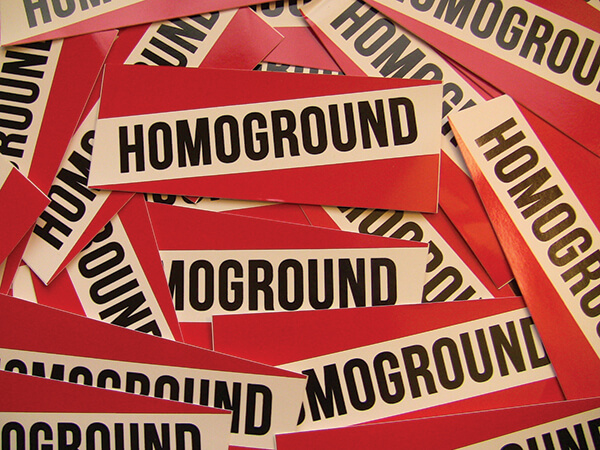[Editor’s note – as with all the articles in this month’s social justice issue, the following is a first-hand essay from an active member of the indie music community. Their experiences and opinions are their own, and we encourage you to join the discussion in the comments section below or on our social media pages.]
Homoground promotes LGBTQ equality by supporting LGBTQ and allied musicians through our website, podcast, zines and live events. The project launched in 2011 to combine a love for music with activism. At the time, I found myself listening to the same bands I was listening to a decade ago. There had to be fresh, new music out there that I could relate with but I didn’t know where to look. I started featuring music my friends were making on the podcast. After a couple episodes, people I didn’t know started contacting me asking if I could feature their bands. The podcast fills a void by giving bands a way to get their music out to an audience that can relate to their experiences while feeling welcomed and safe.
Bands express their biggest challenges to us. They experience the same challenges as any other band: scheduling rehearsals, finding/keeping band members, getting exposure, not having enough time or money to pursue creative passions, mental health and traumatic life events.
Lynn Casper of Homoground
They also struggle with questions like: What is my gender/sexuality? How do I identify? Do I feel comfortable enough being out about my sexuality? Are people going to judge or hurt me because of who I am? Or how I look? What pronouns should I use, if any, when I sing about romance? How will the vocals in my songs change during/after my transition to another gender?
Homoground is more than just music promotion. We’re about strengthening our communities, creating visibility and promoting equality.
We seek to promote groups and projects that are advancing social change.
Over the years, many rock camps have popped up in cities all over the planet empowering young girls and queer youth to play instruments in an environment where they won’t feel judged. Queer rock camps exist in places in the US like the Pacific Northwest, Southern California, and the South.
Music connects people with others who can understand similar struggles, victories, and emotions. Homoground provides ways for music lovers, especially those living in more isolated areas, to discover and access music they might otherwise never be exposed to. Recently, I received a message from someone living on a remote island off of Alaska saying that living on their island is very isolating, but the Homoground podcast helps them feel more connected. The podcast is able to provide a sense of community that otherwise doesn’t exist in reality.
GET YOUR MUSIC FEATURED ON HOMOGROUND
Submit your music through the following link for consideration: http://www.homoground.com/submissions
ABOUT THE AUTHOR
Lynn Casper organizes the Homoground podcast, and in 2012 launched a set of feminist playing cards via Kickstarter. To discover music by queer & allied musicians, visit homoground.com. Subscribe to the Homoground podcast on iTunes at homoground.com/iTunes.
